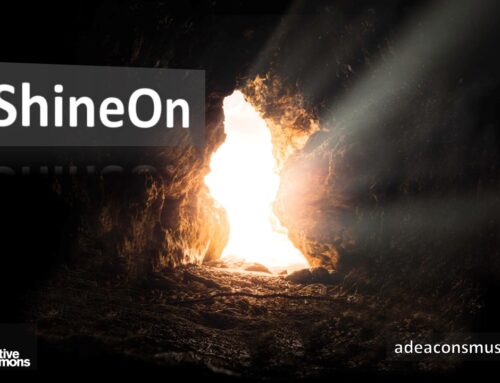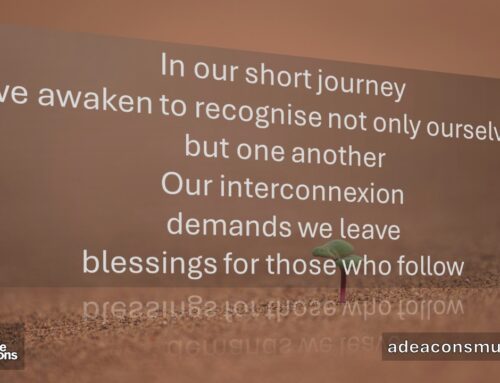For the 2018 Lenten Journey, I am excited to once again be creatively collaborating with Little Britain United Church. Each worship service and blog will be informed by a resource created by Matthew L. Kelly, who is currently in ministry at Christ United Methodist Church in Franklin, Tennessee, USA. I pray that this “Giving It Up” Lenten Journey proves of interest and nurtures the gift of this ongoing conversation with you seekers and readers, who continue to graciously extend trust by engaging with A Deacon’s Musing blog.
Abram and Sarai
12 God told Abram: “Leave your country, your family, and your father’s home for a land that I will show you.
2-3 I’ll make you a great nation
and bless you.
I’ll make you famous;
you’ll be a blessing.
I’ll bless those who bless you;
those who curse you I’ll curse.
All the families of the Earth
will be blessed through you.”
4-6 So Abram left just as God said, and Lot left with him. Abram was seventy-five years old when he left Haran. Abram took his wife Sarai and his nephew Lot with him, along with all the possessions and people they had gotten in Haran, and set out for the land of Canaan and arrived safe and sound.
I marvel about the story of Abram and Sarai … I always have. I would like to say that they must have resisted this new development into which God was calling them. Yet, there are enough examples in the Sacred Stories of the Jewish and Christian traditions that clearly illustrate people who resist when God comes a-calling. I think, therefore, that these two characters were sincerely open to such a change, even though one might expect their age gave them a “pass.” After all they have become beacons for the three traditions that look to them as central to nurturing the Abrahamic faiths: Judaism, Christianity and Islam. Abram and Sarai, in their openness and trust, are much more well known as Abraham and Sarah!
In last week’s first 2018 Lenten blog, we explored letting go of control. Whether as an individual or a community, control is a big factor in the way that we understand ourselves, our mission and purpose. Expectations, as the projections of control, can get in our way and serve to diminish our ability to (at times) hear Creator calling. Sometimes the Holy’s call may align with our expectations, but without intention and practice, I have experienced that this occurs rather infrequently.
As I have been reflecting on this week’s musing, Sarah and Abraham have been speaking to me. In particular, they have often helped me have conversations with congregations that are not only experiencing change, but are recognising it and want to talk about it. This does not mean these are easy conversations, but beginning them helps people name – or at least be open to the naming – whether their expectations are getting in the way of letting God. This idea of “letting God” is popularly expressed as: “Letting go and letting God.”
Letting go of expectations, in order to let God, is complicated. Our stuff, our hopes, wanting to hold on to what was, often regardless of whether that was good, neutral or bad, is sometimes easier than stepping into the unknown: “better the devil you know” as one of those sayings go. Confronting expectations doesn’t necessarily becomes any easier (whether it’s a community of faith or an individual, a family or a business), but I do think there are helpful ways to begin to nurture practices that can be helpful.
One practice that I have explored with communities of faith, and that could also be used personally, is to begin to ask questions that are intentionally provocative. Such questions plant the seeds by asking where is it that we have been most alive and most emboldened to do the unexpected. Though these experiences may have been scary and risk-taking, often they lead to results that otherwise would never have led to not only incremental change, but transformation. This is often cumbersome at first. However, when done in community or in trusted relationships, it has been my experience that once the stories start, they flood.
These passion-filled stories help people begin to see threads that can be translated into a creed or a proposal that expresses how these emboldened moments demonstrate the Spirit’s movement in our midst. With a little work, such creeds become provocative, and are more than a vision of statement of mission. Whether they are in respect to matters of social justice, the innovative use of a faith community’s property or an individual’s mantra, they are intimately grounded in what mystics or spiritual companions call the “examined life.” These creeds keep us challenged, always curious. And in so doing, drive us to share unconditional love while also acknowledging the temptation to surround ourselves with those who are like us, in order to create a safe echo chamber.
Provocative creeds possess this potential because they tap into those moments of risk-taking. These memories link us with times when there was clarity of a purpose greater than our own. Let us begin to develop a lens. One that intentionally allows us to gauge whether the choices before us are informed by our own expectations or a radical call. Discerning such a call is not dissimilar to that which was first heard by Abram and Sarai. With such a lens, therefore, may we begin to awaken that letting Creator means we take seriously the blessing of co-creating a world in which light brightly blazes and in which we are all bid to shine.
#MayItBeSo









Your reflections are most welcome!